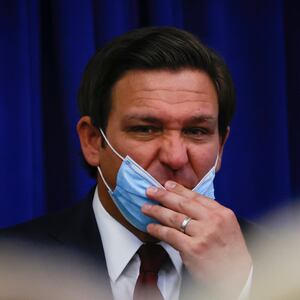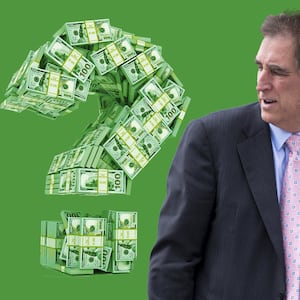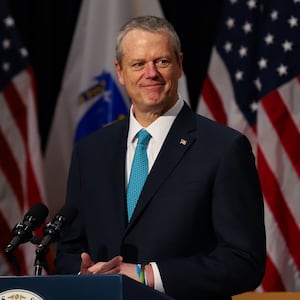Brad Little is no RINO.
During his first term as governor of Idaho, Little enacted a number of archconservative laws on abortion, transgender rights, and gun safety. More importantly to the Republican faithful, he was a solid ally of former President Donald Trump, who called the governor a “terrific gentleman” at an event last year.
By most standards of the modern GOP, Little has done everything right. And yet still, in the eyes of some hardcore conservatives, Little has earned the dreaded label of a RINO—Republican In Name Only—and what accompanies it these days: a primary challenge.
Last year, Idaho Lieutenant Governor Janice McGeachin—a Trump-loving, COVID-skeptical anti-vaxxer who attempted to overturn Little’s modest public health restrictions when he left the state for a conference—launched her bid to unseat the governor in the GOP primary, slated for May.
And in November, McGeachin’s challenge got the ultimate seal of approval in today’s GOP: the coveted “Complete and Total” endorsement from Trump himself.
It’s unclear exactly why Trump decided to personally lend his support to a mutiny against a governor who, to that point, had really done nothing to provoke his ire. The ex-president’s endorsement announcement offered no clues. Not only did it lack the typical smears of a Trump foe, he didn’t mention Little once.
What is clear, however, is that the factors driving the right-wing effort to unseat Little are not unique to him, or to Idaho. Months away from their primary contests in this 2022 midterm election, a number of Republican governors nationwide are under siege.
Of the 15 GOP chief executives who are running for re-election, eight are facing at least one primary challenger running a real campaign. That number stands in stark contrast to the number of credible primary threats faced by the eight Democratic governors running for re-election: zero.
It’s an unprecedented phenomenon for the party, Republican operatives say. “I can’t think of a time when we had this many competitive, or somewhat competitive, Republican primaries for governor,” said a GOP strategist following governor races this cycle. “I don’t think anyone is a lock.”
The GOP’s anti-governor revolt of 2022 has been fueled by the enduring influence of two of the most powerful features in conservative politics: the pandemic, and Trump.
Every governor became something of a household name after COVID, given that their decisions on everything from masking to schools directly impacted the lives of their states’ residents. The Republican governors who didn’t reject public health measures wholesale—and even some who did—faced intense backlash from their right, which grew over the last two years into serious primary threats.
COVID, for example, is the defining feature of the campaign to oust Ohio Gov. Mike DeWine. An establishment Republican with a long record in politics, the party’s base started loathing DeWine for being a rare red-state executive who embraced mask mandates and other public health measures. His chief rival is former Rep. Jim Renacci, a MAGA stalwart who is openly angling for the ex-president’s backing.
That is a testament to Trump’s ironclad hold on the GOP for a fourth election cycle. Indeed, his endorsement means as much as ever, and his singular ability to turn conservative darlings into enemies overnight is the wildcard in every Republican primary nationwide.
The primary motivation for Trump to target GOP incumbents himself isn’t COVID, however, but his endless sense of grievance—particularly around the 2020 election.
Ever since his loss, Trump has punished Republican officeholders who did not try to toss out Joe Biden’s electoral victory. This is the only real issue facing Georgia Gov. Brian Kemp, for example, who is being challenged by former GOP Sen. David Perdue almost entirely over Kemp’s obligation to certify Georgia’s election results.
In Little’s case, it’s COVID and Trump combined. The pandemic forced an otherwise unremarkable and solidly conservative governor into a near-unwinnable situation with the right. And Trump’s lack of compunction about playing in primaries and elevating fringe figures like McGeachin may have dealt Little’s political life a death blow.
“A big chunk of this is about the power and influence that Trump has over the Republican Party,” said the GOP strategist, but “the COVID stuff is what opened the door to some of these primaries.”
The Republican infighting for governors’ seats is unlikely to be a significant boon to Democrats. Georgia, where Stacey Abrams is running again, is the only toss-up state where the Republican incumbent faces a primary, so a weakened GOP nominee could give Abrams a meaningful advantage in November.
Some Democrats also believe that Ohio and Texas are winnable—even more so if the incumbents lose—but those will be difficult targets for the party, given the headwinds facing Democrats nationally.
But even if the GOP’s primary bumper crop yields no flipped seats, the political impact could still be significant. If governors in safely red states are replaced with even more conservative and even more Trump-aligned Republicans, the party’s center of gravity in statehouses around the country will lurch further right. And in order to beat their challengers, incumbents will likely have to shift that way themselves.
At least one popular GOP incumbent, Massachusetts Gov. Charlie Baker, chose to forgo re-election rather than endure what would have been a bitter primary against a Trump-endorsed challenger, Geoff Diehl. That challenge effectively benches Baker, one of the party’s few prominent and politically viable moderates, and all but ensures Democrats will flip the seat.
Of the eight GOP governors facing real challenges—in that their opponents are campaigning and raising actual money—several are very heavy favorites.
In the Texas primary, Gov. Greg Abbott faces Allen West, the notorious far-right ex-congressman and former state GOP chairman; Don Huffines, a wealthy former state lawmaker; and Chad Prather, a conservative radio personality. Huffines, for example, claims that Texas is “turning blue under our RINO leadership.”
But Abbott quickly earned Trump’s endorsement and is sitting on a staggering campaign war chest of $65 million—a combination Republicans see as near-impossible to beat.
In ruby-red Oklahoma, Gov. Kevin Stitt is in a strong position, but faces a revolt bubbling from an increasingly radical Oklahoma GOP. That revolt is led by the fringe Islamophobe John Bennett, who has clashed with Stitt and other GOP officeholders. Mark Sherwood, a Tulsa doctor who has embraced COVID trutherism and the Big Lie, is challenging Stitt. And last week, he appeared at a far-right rally with Bennett and Jackson Lahmeyer, who is challenging incumbent GOP Sen. James Lankford.
To Republican observers like Doug Heye, these kinds of challenges only serve as publicity stunts for conservative figures who want to gain notoriety and aren’t interested in actually holding office.
“We’ve come to a point where there's been such a celebrification of politics that we see more people running because it’s a way to become famous, establish a brand, make money, whatever it may be,” said Heye, a former official at the Republican National Committee. He acknowledged this trend is much more prevalent in the GOP, because of the ways that conservative personalities can leverage right-wing media to accomplish their own goals.
Still, there are several governors facing challenges from Republicans with a clear interest and track record in elected office, like Perdue, Renacci, and McGeachin—all of whom have Trump’s endorsement or, in Renacci’s case, could conceivably get it. Naturally, they are the most threatening.
Alabama is something of a wildcard: GOP Gov. Kay Ivey is facing several challengers, most notably Lindy Blanchard, a wealthy conservative mega-donor who Trump appointed to serve as U.S. ambassador to Slovenia.
Blanchard was running for Alabama’s open U.S. Senate seat before deciding to challenge Ivey in January. She has already spent $1.5 million on her primary campaign, which is vaguely premised on a need for “new leadership” and opposition to COVID safety measures, even though Ivey has made moves like banning businesses from requiring customers to show proof of vaccination and ordering the state to not comply with federal vaccine mandates.
Trump has not weighed in yet on this race, though Blanchard has already attempted to suggest his implicit backing by emphasizing that he nominated her as an ambassador.
Not all challenges conform to Trump and COVID, however. In South Dakota, Gov. Kristi Noem—a one-time superstar of the MAGA right—was beloved among conservatives for her refusal to enact virtually any pandemic restrictions.
But Noem faces a primary challenge from the former speaker of the statehouse, Steven Haugaard, over Noem’s veto last year of legislation to ban transgender women and girls from participating in female sports leagues. The move soured Noem’s reputation among some hardcore conservatives, and Haugaard has described it as a “cave” to “Big Business” and the left.
The GOP’s official arm for governor’s races, the Republican Governors’ Association, did not respond to a request for comment on the primary landscape.
The Democratic Governors' Association told The Daily Beast that, the fact that so many incumbent Republican governors were facing primary challengers "speaks to the unprecedented level of chaos and deep-seated division within the GOP right now."
"GOP governors are spending their time and resources in bitter intraparty feuds, racing to unpopular positions that are completely removed from voters’ actual concerns," the DGA continued. "While they run in primaries, Democrats are running on their records of getting things done for American families.”










